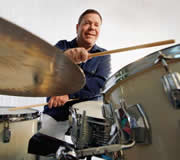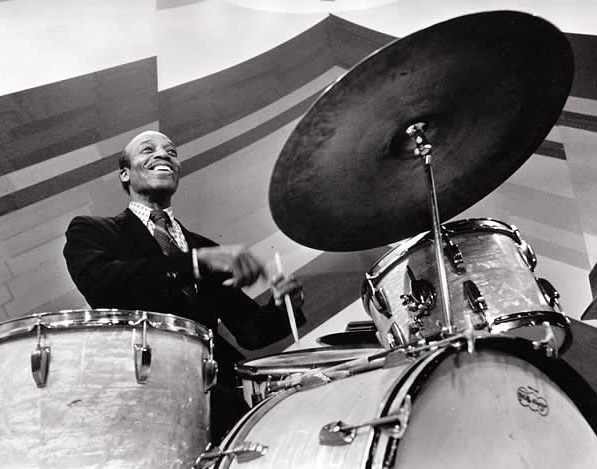MAX AND THE MAESTRO
Sunday, September 16th, 2007The world arts community recently lost two major players: Max Roach from the jazz world and Luciano Pavarotti from opera. Though they came from two different places, they both had one thing in common. They swung. For this tribute, we have enlisted the aid of one of the few who knows both worlds of music very well, the musicologist (and my brother) Joel G. Klauber.
Luciano Pavarotti was the most well known tenor since Caruso, and the most widely talked about. The enthusiasm of his singing, combined with a tremendous personality and showmanship, brought opera to the masses. People who didn’t know anything about opera knew about Pavarotti.
He made is Metropolitan opera debut in 1968. Indeed, his last performance at the Met before his illness was in 2005. He was a master of the lyric tenor roles such as “La Boheme” and “Lucia.” In the early 1970s, he took on more dramatic roles, though in the process, he lost a little of of the lyric sweetness that he had back in the 1960s. The roles demanded it.
Of course, he was known for his effortless high C’s. Shades of Louis Armstrong!
His most famous role was in the “Daughter of the Bigamist,” in which he hit nine, tireless high C’s. It was a classic performance and recording.
Pavarotti’s voice was not especially large, but it was beautiful in the mid-range and superbly focused in the upper range. While it may not have been a “brilliant” sound, it was perfectly focused and placed.
There was only one. And for the millions who bought their first opera CD or DVD of “Three Tenors,” the duets with Frank Sinatra, or something similar—and never made such a purchase before—The Maestro is the one to thank.
Max Roach was one of the most consummate artists in jazz, be it as a brilliant drummer and soloist, a challenging leader, and a talented writer. Roach, along with Kenny Clarke, started the bop revolution in drumming. While Clarke was the actual pioneer, Roach really brought the style to fruition and to its peak, with astounding technique and melodic drum solos.
Clarke is credited with influencing percussive timekeeping, by way of transferring the timekeeping element from the snare and bass drums to the ride cymbal, with appropriate accents on the snare and bass drums. Max extended Clarke’s foundation via his snare, tom-tom and bass drum work, with each drum working independently as both sensitive accompanist and melodic soloist. Max Roach was not merely a timekeeper. He virtually invented the concept of communication between drummer and soloist.
Unlike Clarke and Blakey, Roach explored classical percussion, symphony, odd time signatures (way before Dave Brubeck, God bless him), music derived from Broadway musicals, etc. Indeed, he had been a Professor of Music at Amherst for some year.
Roach’s drum solos were among the most melodic—and perhaps the only—drum solos jazz has ever known where one could actually hear the melody of the song. And this was played, most of the time, on four drums.
He always has had the curiosity to move forward stylistically and grow as a musician.
Roach’s recording career spanned fifty years, from the 1940s through the 1990s. His greatest works? With The Charlie Parker Quintet from 1945 to 1947, his own group with Clifford Brown from 1954 to 1956, and his astounding duets in later years with Dizzy Gillespie and avant gardist Anthony Braxton.
In terms of listening suggestions, there are many, but Max Roach expanded the horizons of percussion in such albums as “Jazz in ¾ Time,” “Max Roach: Percussion Bitter Sweet” (featuring the great trumpet of Booker Little), and “It’s Time,” where Roach experimented with the use of voices in the ensemble.
No, you didn’t see Max on the Johnny Carson or Merv Griffin shows (though he was on the David Frost program). But Max Roach, like Gene Krupa, Jo Jones, Sid Catlett, Dave Tough, Chick Webb and Kenny Clarke before him, forever influenced and dictated the way drums were and are played. — Joel Klauber
Note: Most of you are aware that the Krupa drum sticks are now a reality. Everyone who has tried a pair loves them. In order to serve our many visitors more efficiently in terms of supplying these sticks, Bopworks and I thought it best to order directly from Bopworks. They may be reached by logging on to www.Bopworks.net.






